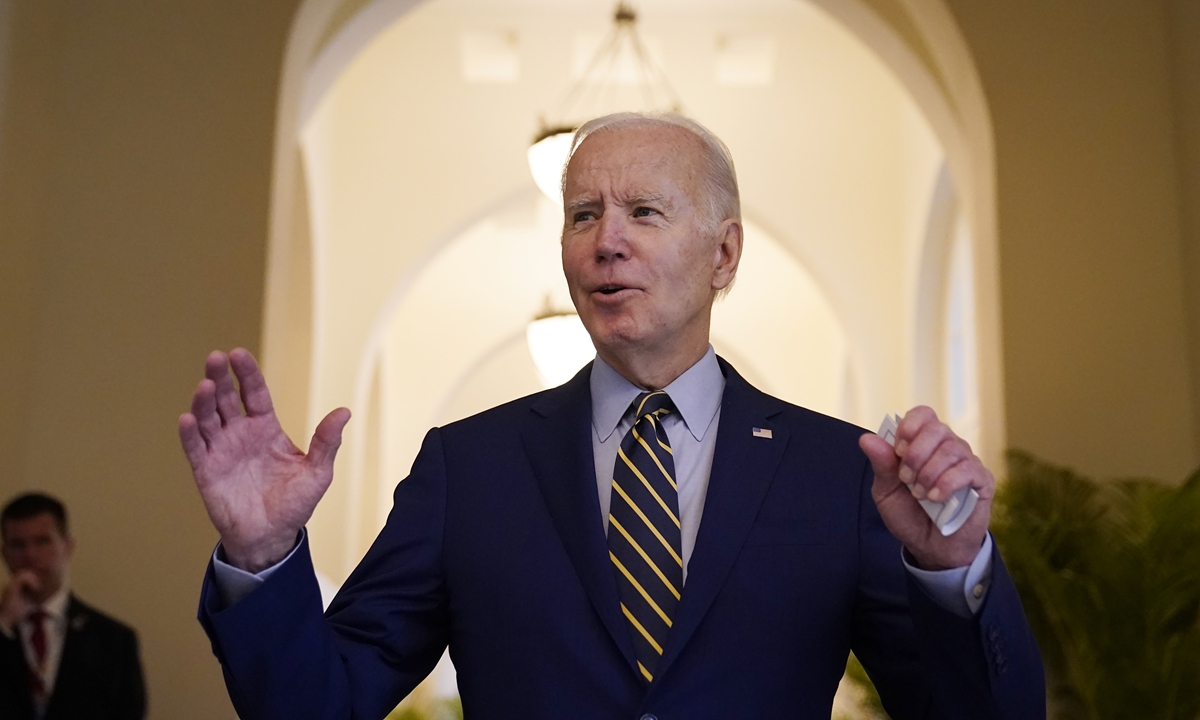Biden needs to handle ties with China 'more cautiously' despite Democrats retains power in Senate

US President Joe Biden speaks to media about the Democrats keeping the Senate before the Association of Southeast Asian Nations (ASEAN) summit, Nov. 13, 2022, in Phnom Penh, Cambodia. Photo: VCG
While the US Democrats will keep their narrow Senate majority for the next two years, the control of the House is still not assured for either party as counting continues in some states as of press time.
Chinese analysts said the situation is not surprising and will not bring big changes to the China-US tension, but considering the Republicans could take more provocative actions against China if they take the House, albeit with a slim majority, the White House will need to handle China ties with more finesse so the US can prevent a loss of control in bilateral ties.
If Republicans do retake the House, the Biden administration will face obstacles and challenges in domestic and external affairs. For instance, Republicans might slow down or pare back assistance for Ukraine and make it hard for the US to fulfill its commitments on climate change, which will weaken the US' image and authority among its allies, said experts.
The top leaders of the world's two biggest economies are scheduled to meet in Bali, Indonesia on the sidelines of the G20 Summit, which is a positive signal to the world, especially to the fragile global economic recovery, and with the Democrats securing control over the Senate, some US media and observers consider that US President Joe Biden will be more confident at the upcoming talks with Chinese President Xi Jinping.
However, Chinese experts said Biden will need to be more cautious and balanced as he wants to prevent the China-US tension from losing control. A senior White House official said Thursday Biden wants to use the talks with Xi to "build a floor" for the relationship - in other words, to prevent it from free-falling into open conflict, Reuters reported on Friday.
"As we expected, the Democrats retain at least 50 Senate seats, but still look likely to lose the House, which matters due to its budget control powers, so this means the partisan struggle between Democrats and Republicans will become even more intense," Lü Xiang, an expert on US studies and a research fellow at the Chinese Academy of Social Sciences, told the Global Times on Sunday.
Jin Canrong, associate dean of the School of International Studies at the Renmin University of China, said on Sunday that if Republicans do regain control of the House, the commitments the Biden administration has made will be impacted on at least two issues - the Ukraine crisis and climate change, because Republicans have already questioned the necessity to provide Ukraine with such a huge amount of supplies, especially when the US economy is still in trouble, while the two parties always disagree on climate change.
Recent comments from Kevin McCarthy, who is in line for speaker if Republicans win the House, exacerbated the fears among Washington and Ukraine, as well as some European allies over the possibility of a cut to financial and military supplies to Ukraine, the AP reported on Saturday. McCarthy warned in October that Republicans would not support writing a "blank check" for Ukraine if they captured the majority.
Lü said the House has the power to control the budget, so no matter whether McCarthy becomes the new speaker or not, if Republicans are in majority, US supplies to Ukraine will surely be impacted.
Apart from the Ukraine issue, if Republicans take the House, Biden will find it almost impossible to deliver on his promises at the COP27 Climate Summit of a "low-carbon future," and this will also further damage the mutual trust between the US and major EU members like Germany and France, Jin said.
"When the US alliance system is in trouble, it makes it unlikely that Biden will take a stronger position on China, so the future policy toward China would largely follow the current status quo," Jin said.
The US could also ask China to offer more cooperation on issues like the Ukraine crisis, the Korean Peninsula and Iran nuclear issues, as well as climate change, said some observers.
"Since many communication channels have been canceled and cut off after the extreme provocation of Nancy Pelosi's visit to Taiwan island, Biden might ask China to reopen these channels, but China won't deliver what he wants easily, because this depends on how the US acts in fulfilling its promises about the one-China principle and opposition toward Taiwan secessionism," Jin said.
The Republicans are showing a much more hostile stance toward China, as politicians like McCarthy have said they will be tougher on issues like COVID-19 origins tracing and the Taiwan question, with McCarthy vowing to visit the island.
More importantly, the two parties share consensus on pushing the Taiwan Policy Act, which might break the US' strategic ambiguity on the Taiwan question and bring serious damage to the foundations of China-US relations, experts said.
"If Biden and the White House choose the same approach as the Republicans claim they will have, China-US relations will go out of control, and this goes against Biden's plan to build a 'floor' for the ties. So after the midterm elections, Biden may take a more cautious and less provocative stance to deal with China to balance the uncertainties from Congress," Lü said.



